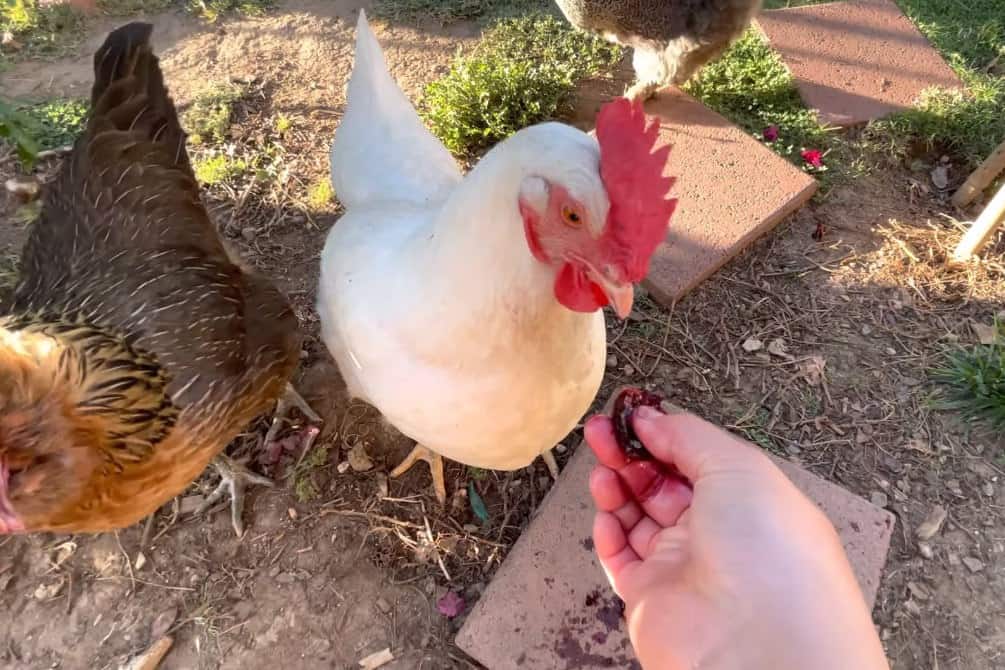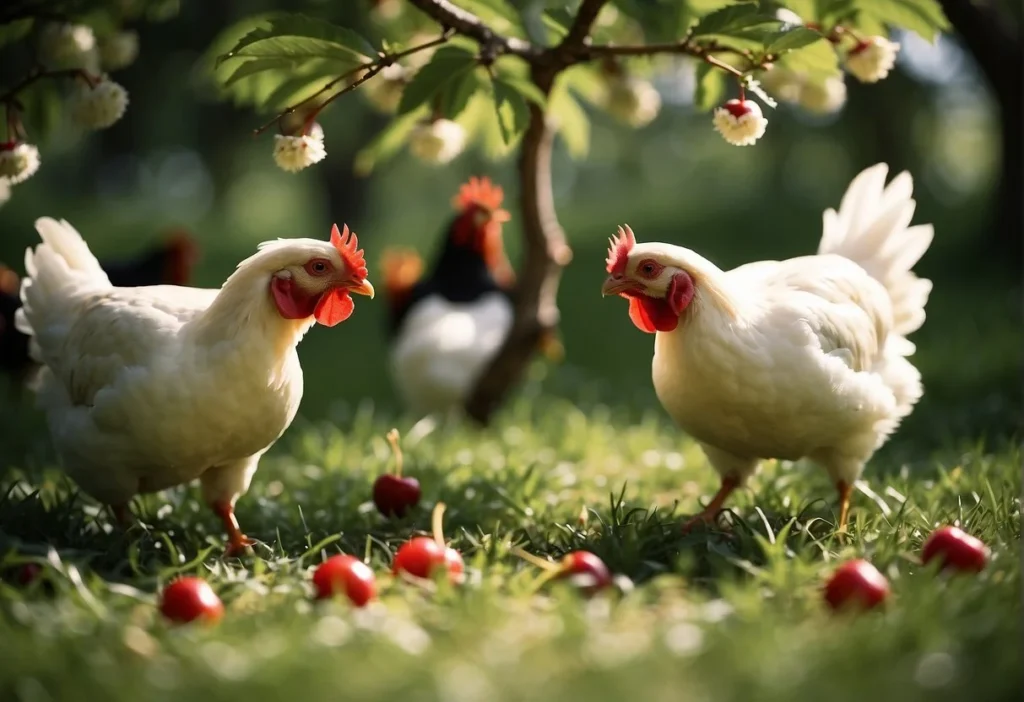Introduction to Chickens and Their Diet
Chickens are charming, lively creatures that bring joy to any backyard. As a chicken owner, you want to provide your flock with the best diet possible. Can Chickens Eat Cherries But have you ever wondered if chickens can indulge in fruits like cherries? These sweet and succulent treats might seem like a delightful addition to their feed, but it’s essential to know how they fit into your hens’ dietary needs.
In this article, we’ll explore everything you need to know about feeding cherries to your chickens. From understanding their nutritional value Can Chickens Eat Cherries to precautions and tips for growing cherry trees yourself, we’ve got all the information you need right here! Let’s dive into the juicy world of cherries and discover how they can benefit your feathered friends.
The Nutritional Value of Cherries for Chickens
Cherries are not just a delightful treat for humans; they can also be beneficial for chickens. These vibrant fruits pack a punch when it comes to nutrition.
Rich in antioxidants, cherries help combat oxidative stress in your flock. This is crucial for overall health and longevity.
Additionally, cherries provide essential vitamins like A and C. Vitamin A supports vision and immune function, while vitamin C aids in their body’s ability to fight off illnesses.
The fiber content in cherries promotes healthy digestion. A well-functioning digestive system ensures that your chickens absorb nutrients effectively from their diet.
Moreover, the natural sugars found in cherries serve as an energy boost without unhealthy additives. Chickens love the taste too!
Remember, moderation is key when introducing any new food into their diet to maintain balance and prevent any adverse effects on their health.
Precautions When Feeding Chickens Cherries

When considering cherries for your flock, moderation is key. Too much of this fruit can upset their digestive system. A small handful is more than enough to start.
Remove the pits before offering cherries. These contain cyanide compounds that are harmful to chickens if ingested. Even a few bits could pose a risk.
Watch for any signs of discomfort after feeding them cherries for the first time. This includes lethargy or unusual droppings. If you notice anything off, it’s best to stop giving them cherries and consult a vet.
Always rinse fruits thoroughly to eliminate pesticides or chemicals that may be present on the skin. Organic options are preferable when possible.
Keep an eye on how your chickens react over several feedings before making cherries a regular treat in their diet. Each chicken may respond differently, so stay attentive!
How to Introduce Cherries into a Chicken’s Diet
Introducing cherries to your chickens can be a delightful experience for both you and your flock. Start by selecting fresh, ripe cherries. Wash them thoroughly to remove any pesticides or dirt.
Cut the cherries in half and pit them; this is crucial since the pits can pose a choking hazard. Chickens are curious creatures, so offering them small pieces will encourage exploration of new flavors.
Initially, provide just a few cherry halves to see how they react. Monitor their enthusiasm; some may dive right in while others take their time warming up to this treat.
If they seem interested, gradually increase the amount over several days. Always observe for any signs of digestive issues after introducing new foods like cherries into their diet. Mixing chopped cherries with other grains or vegetables can make it more appealing as well!
Other Fruits and Vegetables That Are Safe for Chickens to Eat
Chickens are quite the adventurous eaters. Beyond cherries, they enjoy a range of fruits and vegetables that can boost their health.
Apples are a favorite treat. Just remove the seeds before offering them to your flock, as those can be harmful.
Berries such as strawberries and blueberries provide antioxidants and make for a tasty snack.
Leafy greens like kale, spinach, and lettuce also contribute essential vitamins while keeping your chickens happy.
Carrots are another great option; chop them up for easy consumption.
Pumpkin is not only safe but also packed with nutrients—perfect for fall offerings!
Consider adding cucumbers during warm months for hydration benefits too. Offering variety keeps mealtime interesting for your feathered friends while ensuring they get all needed nutrients in their diet.
Tips for Growing Your Own Cherry Trees for Your Flock

Growing your own cherry trees can be a rewarding experience for both you and your chickens. Start by selecting the right variety suited for your climate. Sweet cherries thrive in warmer zones, while sour cherries are more cold-tolerant.
Choose a sunny spot with well-drained soil to ensure healthy growth. Cherry trees need ample sunlight, so aim for at least six hours of direct sunlight each day.
Water them regularly but avoid waterlogging; consistent moisture is key during their growing season. Mulching around the base can help retain moisture and suppress weeds.
Be mindful of pests like aphids or birds that may enjoy snacking on young fruit before your chickens get to it! Regularly check for any signs of infestations.
As the trees mature, consider planting multiple varieties to extend your harvest period and provide diverse treats throughout the summer months. Your flock will appreciate fresh cherries straight from your backyard garden!
Conclusion Can Chickens Eat Cherries
Chickens can enjoy cherries as a delightful treat in moderation. These fruits provide various nutrients that support their health and well-being.
It’s essential to remember the importance of balance in their diet. Fresh fruits, including cherries, should complement their primary feed rather than replace it.
By being mindful of how you introduce new foods, your flock can experience a diverse range of flavors and nutrients. This approach not only enhances their diet but keeps them happy and engaged.
Consider incorporating other safe fruits and vegetables for an even richer feeding experience. Your chickens will appreciate the variety while benefiting from the nutritional boost these treats offer.
Always observe your birds when introducing anything new to ensure they adapt well without any issues. Happy pecking!
FAQs
Can chickens eat cherries?
The simple answer is yes. Chickens can enjoy cherries as an occasional treat. Just remember to remove the pits, as they can pose a choking hazard.
What nutritional benefits do cherries provide for chickens?
Cherries are rich in vitamins A and C, along with antioxidants. These nutrients support overall health and boost the immune system of your flock.
How should I introduce cherries into my chicken’s diet?
Start by offering small amounts and monitor their reaction. If they seem to enjoy them without any digestive issues, you can gradually increase the quantity.
Are there other fruits that chickens can safely eat?
Absolutely! Chickens can snack on berries, apples (without seeds), melons, bananas, and many more fruits. Always research before introducing new foods.
Can I grow cherry trees for my chickens?
Yes! Growing your own cherry trees is a great way to provide fresh fruit for your flock. Ensure you pick varieties that suit your climate and space requirements.
Is it safe to give dried cherries or cherry products to my chickens?
It’s best to stick with fresh fruit when feeding your flock. Dried fruits often contain added sugars or preservatives that aren’t suitable for their diet.
By carefully incorporating cherries into their meals while considering these guidelines, you’ll enrich both their diets and enjoyment during treat time.
Also read: Higgs Domino Island








One thought on “Can Chickens Eat Cherries A Comprehensive Guide”